
Columbia University activist and student Mohsen Mahdawi graduated on Monday — after he was released from ICE jail late last month. As he crossed the stage, students erupted in thunderous applause. Democracy Now! spoke with Mahdawi after the ceremony. “I am coming here to be in the middle of this fire because I am a peacemaker, because I am a firefighter,” says Mahdawi, who plans to attend Columbia University’s graduate School of International and Public Affairs in the fall.
Transcript
AMY GOODMAN: This is Democracy Now!, democracynow.org, The War and Peace Report.
We end today’s show on the campus of Columbia University, where graduation ceremonies are being held this week. On Monday, Palestinian student Mohsen Mahdawi walked across the stage to receive his GS diploma from the Columbia University School of General Studies. Students erupted in thunderous applause. There was a standing ovation.
ANNOUNCER: Mohsen Mahdawi.
CROWD: [cheering]
AMY GOODMAN: Mohsen Mahdawi’s path to graduation was not an easy one. In mid-April, he was arrested in Vermont when he appeared for what he had been told was his naturalization interview. After the interview, he was taken away by armed, masked and hooded federal agents.
Mohsen moved to Vermont from the occupied West Bank in 2014, where he lived in al-Faraa, a Palestinian refugee camp. At Columbia University, he was co-president of Columbia’s Palestinian Students Union and served as president of Columbia University’s Buddhist Association for two years.
Mohsen is one of several students who have been detained by the Trump administration. His former classmate Mahmoud Khalil is still locked up in Louisiana since early March. Mohsen Mahdawi spent two weeks in a Vermont prison before a federal judge in Vermont ordered him released on bail. The judge, Geoffrey Crawford, compared the recent detentions of immigrant student protesters to the Red Scare and the Palmer Raids.
Crawford ruled Mahdawi should stay in Vermont but could come to New York for educational purposes. When the government objected to him crossing Vermont lines to come to New York, the judge responded, Mohsen Mahdawi could travel to New York to attend his graduation at Columbia. The judge went on to write, quote, “During his time in New York State, Mr. Mahdawi is permitted to move freely and conduct his daily activities normally including, but not limited to, meeting with elected officials, speaking with and being interviewed by members of the press and media, speaking at public events, attending protests,” the judge wrote.
On Friday, Mohsen appeared in our Democracy Now! studio for his first live interview since being released from prison. Well, on Monday, I met up with Mohsen again and spoke to him just after he graduated.
MOHSEN MAHDAWI: My name is Mohsen Mahdawi, and I just graduated from the School of General Studies.
AMY GOODMAN: And how do you feel? Talk about walking up on the stage and your thoughts today.
MOHSEN MAHDAWI: A mix of feelings, some conflicting feelings. There is a strong sense of joy that I am able to come to this university all the way from a refugee camp, to survive the war, to be able to continue holding on hope, to climb the wall, the 30-foot wall, on a constructed ladder, and come down by a rope, to make it to America in order to be able to fulfill my uncle’s dreams, which is, education is hope, and education is light. So there is joy in that.
There is sadness that my uncle is not here to witness this. And there is sadness that my family, my parents, could not leave the West Bank and come and see this moment. And there is sadness that there are no universities left in Gaza where students can experience such a joy, where hope can be harnessed in universities.
And there is joy that also the Trump administration and this unjust government that tried to keep me in prison — I am on university campus, not in prison. I am in my graduation clothes, not in my prison clothes. And I am celebrating here around a buffet, not having the 20 minutes prepared meal in the prison.
So, if this is something, this is the hope that I gift, the light that I gift to the American people, to the good American people who have supported me, to the Vermonters, to the people who fought for justice. It’s a hope that democracy is functioning, the justice system that gave me the order to be here is in place, and that our fight for justice, our fight for peace, is a fight for humanity, not only for the Palestinian people.
AMY GOODMAN: The judge rebuked the government when they said you couldn’t travel over state lines from Vermont, where you were just released from jail, to your graduation. Can you explain what he said?
MOHSEN MAHDAWI: Judge Crawford has been a person who’s holding the scale of justice very firmly. This is what I am fighting for. Justice and peace go hand in hand. This is what I want. And Judge Crawford has granted me to come to New York City to participate in events, in protest. That’s my free speech right, First Amendment right in this country. And he has granted me the chance to be with the community that I love. And they love me, and I love them. You saw how they cheered me up. It doesn’t matter what the Trump administration is saying and accusing me of. Columbia University gave the answer. And it comes from the students and from the professors, not from senior administration or from unjust government or unjust laws.
AMY GOODMAN: You got a standing ovation when you graduated. Can you talk about how you felt at that point?
MOHSEN MAHDAWI: I felt honored and humbled. I felt that the inner child who has suffered, and the story of many other children who are suffering and who have suffered, is being seen and acknowledged. And I felt that people stood up for justice, for peace, for human rights and for international law. This is my message, a message of peace, a message for justice.
AMY GOODMAN: What did you think of the valedictory, the valedictorian, who referenced the number of people who are not here at graduation?
MOHSEN MAHDAWI: He’s a brave — he’s a very brave man. And you have to keep in mind that he comes from an Irish heritage, from resilience, from resistance, from understanding injustice anywhere is a threat to justice everywhere, as Martin Luther King have said.
What this university is doing is ridiculous. They are suspending students. They are expelling students just for protesting against the war. What kind of values these universities would have, if it doesn’t allow itself to align with international law and human rights? What worth our degrees? You see the names of philosophers. You see the names of philosophers engraved on buildings in these universities, the most significant ones, Law Library and Butler Library. What is the point if we are studying those philosophers, and we are just not bringing those theories into action — justice, education, interconnectedness, peace, harmony, empathy, forgiveness? This university is a betrayal to all of those values. And what it’s doing here is degradating and destroying the democratic system, that depends on votes, on sharing voices, and they’re telling the students and the professors, “You don’t matter.” But the students’ voice is much louder than the money that the university receives.
AMY GOODMAN: We’re standing next to SIPA, the school you hope to go to in the fall. Do you think you’ll be able to? You’re in an immigration proceeding now, even though you were going towards naturalization and U.S. citizenship.
MOHSEN MAHDAWI: Look, I plan on attending SIPA. There are many obstacles: obstacles with the immigration system, obstacle with the federal justice system, and an obstacle with this university that refused to give me a scholarship. They gave me zero funding, even though they accepted me based on merit. But I tell them that I am coming here to be in the middle of this fire, because I am a peacemaker, because I am a firefighter. And I will come here to study international affairs, focusing on diplomacy and security, and focusing on conflict resolution and peacemaking. This is the story of hope, from a refugee camp to Columbia.
AMY GOODMAN: “From a refugee camp to Columbia.” Palestinian student activist Mohsen Mahdawi, speaking after graduating from Columbia University on Monday, just three weeks after a federal judge had him released from a Vermont prison. During his interview, Mohsen Mahdawi referenced the valedictorian address by the Irish student Peter Gorman.
PETER GORMAN: Good morning to the 2025 graduates of the School of General Studies. And congratulations! I cannot say how shocked and honored I was to find myself as your valedictorian this year. It begs a question: How does one speak to these people I found myself graduating alongside, the incredible depth and breadth of experience out here? How does one speak in these times, to people whose Columbia experience has been defined by personal and political struggle, by protest and by the university’s response to it? We’ve been challenged not just to learn, but to act. In making that decision, some of us have paid a price. As we graduate, we should remember that this is the first time since 1968 that a Columbia graduating class has been reduced by suspension for political protest, and the first time since Robert Burke in 1936 that a Columbia class has been reduced by expulsion for political protest.
AMY GOODMAN: Excerpts of Peter Gorman giving his valedictory address at Columbia University on Monday. After the ceremony, I spoke to Palestinian American student activist, who also just graduated, Maryam Alwan.
MARYAM ALWAN: I was arrested and suspended for the first encampment. And actually, I was wearing a Columbia shirt when I was arrested, and that was the last time that I wore the Columbia logo. And now I’m wearing it again now that I’m graduating. I honestly did not think that I would graduate, given the level of repression against pro-Palestinian students. So, it’s a really powerful moment for me. But at the same time, I feel almost guilty, because so many are not able to graduate, not only the students who have been disciplined at Columbia, but also the students in Gaza who have been killed. And so, I wanted to do everything I can to show that I’m sticking with them.
AMY GOODMAN: As the reception went on, outside the gates of Columbia University, dozens of Columbia professors lined up to hold a vigil around the continued detention of Mahmoud Khalil and other students. This is Columbia Medical School public health, biostatistics professor Melanie Wall.
MELANIE WALL: I’m Melanie Wall, professor of biostatistics in the Department of Psychiatry in the Medical Center at Columbia University. The students who have been protesting, and we don’t think that the government should, you know, keep this case for antisemitism being the excuse for why that our grants are being taken away, and that we have many different things that we’re wanting the university to do in terms of self-governance. We are wanting them to not take over the University Senate. We’re wanting them to allow faculty be part of the choice of the next university president. We want to protect students and scholars being able to protest. And we want all those things, as well as we want them to fight back against the Trump administration to get our — to keep our grants. And so, it’s not a medical campus —
AMY GOODMAN: That was Columbia University biostatistics professor Melanie Wall.
And that does it for our show. Democracy Now! is currently accepting applications for a director of technology to lead our broadcast, digital and IT operations. You can learn more and apply at democracynow.org. I’m Amy Goodman — this is Democracy Now!, democracynow.org — with Juan González, for another edition of Democracy Now!

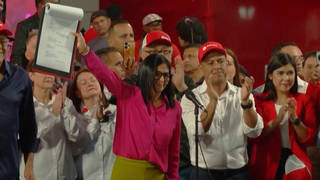
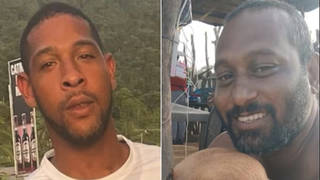
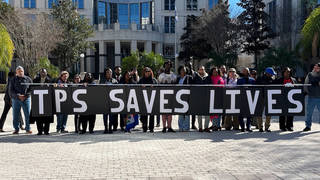
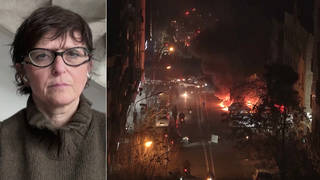







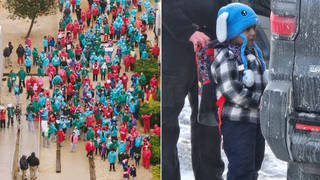
Media Options